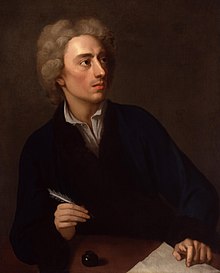
Back Alexander Pope ALS Alexander Pope AN ألكسندر بوب Arabic الكسندر بوب ARZ अलेक्जेंडर पोप AWA الکساندر پوپ AZB Аляксандр Поўп Byelorussian Александър Поуп Bulgarian अलेक्जेंडर पोप Bihari আলেকজান্ডার পোপ Bengali/Bangla
Alexander Pope | |
|---|---|
 Portrait by Michael Dahl, c. 1727 | |
| Born | 21 May 1688 O.S. London, England |
| Died | 30 May 1744 (aged 56) Twickenham, Middlesex, England |
| Resting place | St Mary's Church, Twickenham, Middlesex, England |
| Occupation | Poet, writer, translator |
| Genre | Poetry, satire, translation |
| Literary movement | Classicism, Augustan literature |
| Notable works | The Dunciad, The Rape of the Lock, An Essay on Criticism, his translation of Homer |
| Signature | |
 | |
Alexander Pope (21 May 1688 O.S.[1] – 30 May 1744) was an English poet, translator, and satirist of the Enlightenment era who is considered one of the most prominent English poets of the early 18th century. An exponent of Augustan literature,[2] Pope is best known for his satirical and discursive poetry including The Rape of the Lock, The Dunciad, and An Essay on Criticism, and for his translations of Homer.
Pope is often quoted in The Oxford Dictionary of Quotations, some of his verses having entered common parlance (e.g. "damning with faint praise" or "to err is human; to forgive, divine").
- ^ "Alexander Pope: The Evolution of a Poet" by Netta Murray Goldsmith (2002), p. 17: "Alexander Pope was born on Monday 21 May 1688 at 6.45 pm when England was on the brink of a revolution."
- ^ Foundation, Poetry (29 April 2021). "Alexander Pope". Poetry Foundation. Archived from the original on 27 April 2021. Retrieved 30 April 2021.